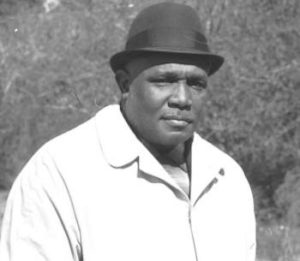
Amzie Moore
*Amzie Moore was born on this date in 1911. He was a Black activist, leader, and entrepreneur in the Mississippi Delta.
Moore was born on the Wilkin Mississippi plantation near the Grenada and Carroll county lines. After his mother died in 1925, he was left on his own at fourteen. Moore completed high school but could not realize his dream of a college education. Throughout the rest of his life, however, he worked to educate himself. By 1935, he had gained a federal job in the U.S. Post Office, considered a lucky opportunity during the Great Depression.
Even before leaving Mississippi to fight in World War II, Moore was involved in race relations. He served over three and a half years in the United States Army, including overseas, before returning to his job at the post office. After the war, Moore opened a gas station, beauty shop, and grocery store on Highway 61 in Cleveland, Mississippi. His business also served as headquarters for the area's civil rights efforts. At his gas station, which was one of the few owned by an African American, he refused to have separate white and Black bathrooms.
Beginning in 1951, Moore, Aaron Henry, and Medgar Evers worked with Dr. T.R.M. Howard, a self-made entrepreneur, fraternal organization leader, and surgeon, to build the Regional Council of Negro Leadership (RCNL). The RCNL sought to encourage entrepreneurship, self-help, and civil rights in the Delta. He participated in the RCNL's campaign to boycott gas stations that failed to provide restrooms for Blacks. His gas station was one of the few that allowed blacks to use restrooms between Memphis and Vicksburg. During this period, Moore also belonged to the United Order of Friendship, a fraternal society headed by Howard to provide low-cost medical care to Blacks. He was part of the Council of Federated Organizations (COFO), a coalition of the major Civil Rights Movement organizations operating in Mississippi. Moore conceived of the voter registration campaign that was later the centerpiece of Freedom Summer in 1964.
The local leader welcomed outside help, including the Student Nonviolent Coordinating Committee (SNCC) organizer Bob Moses, coming into the Delta from New York City to build SNCC. Moses later said that Moore was a guiding force from the start. After passing the Voting Rights Act in 1965, Moore continued his social and economic activism. He retired from the post office in 1968 and began to organize programs for Head Start and the Child Development Group of Mississippi. He worked with the National Council of Negro Women and helped obtain low-income housing at the Turnkey III Project in East Cleveland. He later married Mary Chatman. Amzie Moore died in Bolivar County Hospital in Cleveland on February 1, 1982. He was sixty-nine years old.